Introduction
At times, people go to great lengths to attempt to “justify” behaviour they know is wrong or that others regard as wrong. This attempt to justify is known as rationalization. We all have rationalized at some point in our lives, and some of us may even do it daily. Understanding this defense mechanism is crucial for personal growth and maintaining healthy relationships.
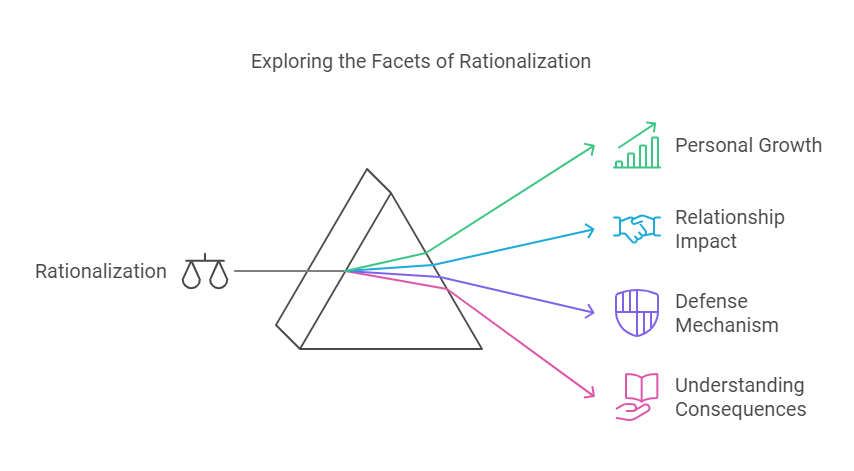
What is Rationalization?
Rationalization is a defense mechanism identified by Freud. When people struggle to deal with the reasons behind their behaviours, they protect themselves by creating self-justifying explanations. This mental detour helps them avoid feelings of guilt, shame, or regret when their actions do not align with their self-image or values.
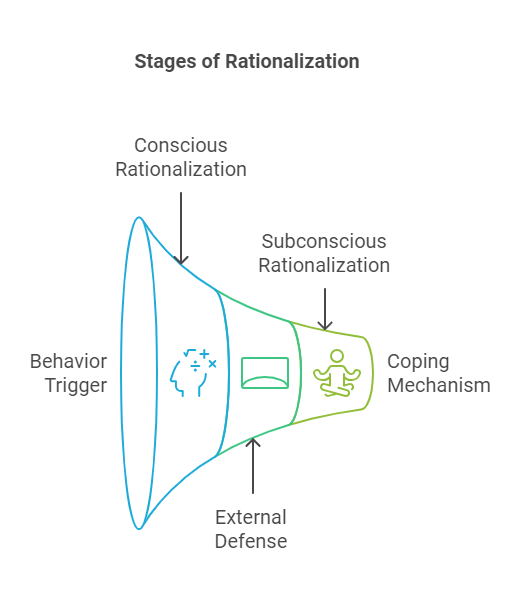
Freud’s Perspective
Freud explained that rationalization helps individuals cope with their behaviours by constructing plausible but untrue reasons for their actions. This process can range from fully conscious (presenting an external defense against ridicule) to mostly subconscious (blocking internal feelings of guilt).
Reasons for Rationalization
Rationalization can occur for various reasons:
- Personal Actions: Justifying one’s own behaviour to alleviate discomfort.
- Beliefs and Values: Finding reasons for one’s beliefs and values to maintain a consistent self-image.
- External Circumstances: Explaining external events or actions of others to avoid internal conflict.
How Rationalization Helps
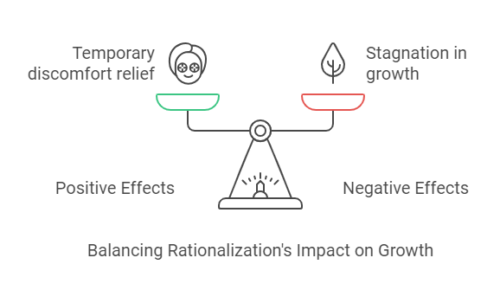
Rationalization can temporarily ease discomfort. For example, someone who gets rejected from a job might say, “I did not want this job anyway.” This rationalization helps them overcome the disappointment and can motivate them to develop their skills.
However, if overused, rationalization can hinder personal growth. If the same person continues to rationalize their rejections without improving their skills, they may remain stuck and not achieve their goals.
The Downside of Rationalization
While rationalization can be a short-term coping mechanism, it has long-term drawbacks:
- Hindrance to Growth: Persistent rationalization prevents individuals from addressing and improving their shortcomings.
- Strained Relationships: Rationalizing actions can create a disconnect between true intentions and expressed reasons, eroding trust and understanding.
- Barrier to Self-Awareness: It blocks introspection, trapping individuals in a cycle of excuse and repetition.
Rationalization and Self-Serving Bias
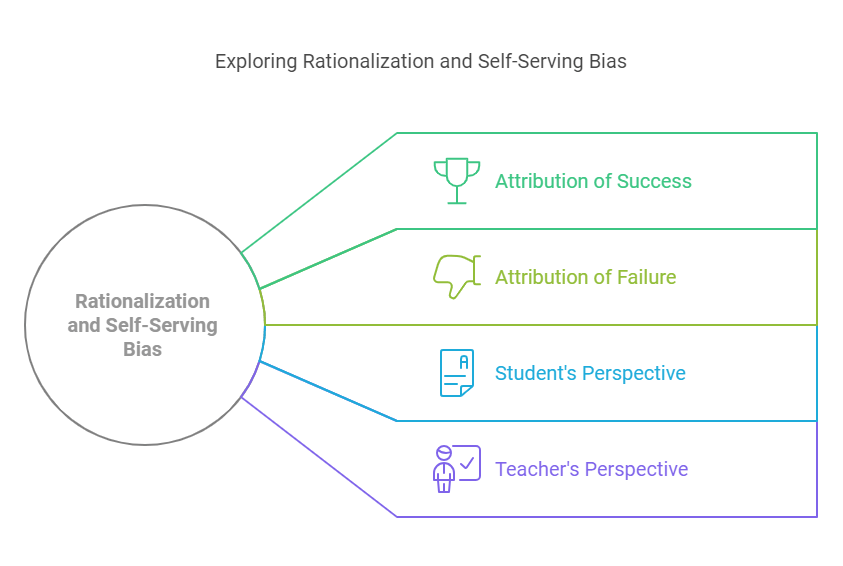
Rationalization is closely linked to the self-serving bias, where people attribute success to their qualities and failures to external factors. For example, a student might blame poor grades on a stringent examiner rather than their lack of effort, while a teacher might take sole credit for students’ success, ignoring their hard work.
Types of Rationalizations
Rationalizations can generally be divided into two types:
- Silver Lining: Finding a positive angle in a negative situation. For instance, someone rejected from a job might say, “Something better awaits me.”
- Sour Grapes: Devaluing something unattainable. For example, saying, “I wasn’t interested in that job anyway.”
The Rationalization Process
Rationalization involves creating excuses for one’s mistakes to avoid self-condemnation or condemnation by others. This can be fully conscious or mostly subconscious and serves as a defense mechanism to protect one’s self-esteem.
Rationalization in Therapy
For therapists, rationalization is a critical barrier to client growth. Clients often defend unhelpful behaviours with rationalizations, obstructing their path to personal goals. Therapy aims to dismantle these defenses, guiding clients to confront the roots of their justifications.
Overcoming Rationalization with Cognitive Hypnotic Psychotherapy
Cognitive Hypnotic Psychotherapy (CHP) offers a comprehensive suite of techniques designed to help clients overcome rationalization. These techniques are grouped into distinct categories:
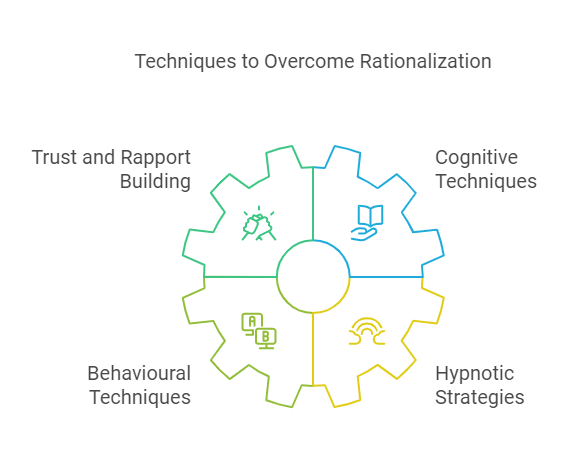
- Trust and Rapport Building
- Conversational Hypnosis: Uses subtle language patterns to create a sense of connection and understanding.
- Active Listening: Demonstrates empathy and validates the client’s feelings.
- Cognitive Techniques for Awareness and Identification
- Reflective Listening: Echoes the client’s rationalizations back to them.
- Socratic Questioning: Guides clients to critically examine their rationalizations.
- Reality Testing: Encourages clients to compare their rationalizations with objective facts.
- Journaling: Promotes clearer self-awareness through writing.
- Behavioural Techniques for Change
- Behavioural Experimentation: Tests rationalizations in real-world scenarios.
- Role-Playing: Allows clients to experience different perspectives.
- Hypnotic and Imaginal Strategies for Emotional Processing
- Visualization and Guided Imagery: Envisions alternative outcomes to reduce the appeal of rationalizations.
- Metaphor Therapy: Simplifies complex emotions through storytelling.
- Perceptual Position: Observes and reinterprets behaviours aligning with reality.
- Anchoring: Associates physical stimuli with desired emotional states.
- Parts Integration: Resolves internal conflicts by integrating conflicting parts of the self.
- SWISH Pattern: Disrupts negative thought patterns with empowering images.
- NLP Timeline Therapy: Reframes negative emotions or beliefs from past events.
Conclusion: Embracing the Truth Within
Rationalization is a common human experience, but unmasking it is a journey toward authenticity. By understanding and addressing rationalization, individuals can achieve genuine growth, forge stronger relationships, and lead lives grounded in reality and personal truth.
Cognitive Hypnotic Psychotherapy provides a structured pathway for therapists to support their clients in replacing rationalization with honest reflection and self-awareness.

